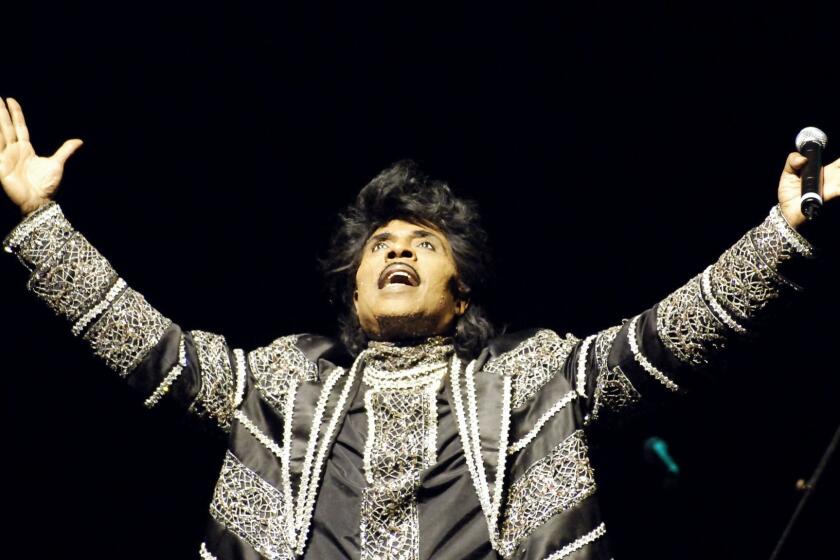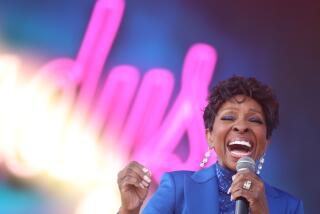10 videos that prove Little Richard rocked harder than anyone, ever
Little Richard upended American culture starting in the mid-1950s with a set of scorched-earth performances on record, in concert, in film and on televison. The high-pompadoured pianist, born Richard Penniman, screamed, whooped and pounded on his keys as he ripped through ecstatic R&B songs including “Long Tall Sally,” “Tutti Frutti” and “Rip It Up.” Awestruck teens erupted — and furrow-browed parents wondered if they were witnessing the end of civilized culture. (They were.)
Below are 10 heart-pounding examples of Little Richard defining not only the sound of rock ’n’ roll, but its look and style as well.
Little Richard, the flamboyant, piano-pounding showman who injected sheer abandon into rock ’n’ roll in its early days, died Saturday. He was 87.
“The Girl Can’t Help It”

One of the earliest rock ’n’ roll movies, “The Girl Can’t Help It” starred Jayne Mansfield and featured performances by musicians including Gene Vincent, Eddie Cochran, the Treniers and Fats Domino. The film was named for Little Richard’s song of the same name, about a woman so sexy that “If she walks by and the menfolks get engrossed (she can’t help it, the girl can’t help it) / If she winks an eye and bread slices turn to toast (she can’t help it, the girl can’t help it).” Little Richard’s performance in this film, which premiered in England in 1957, is said to have helped set a young John Lennon on his course.
“Long Tall Sally”

A year earlier, Little Richard’s charisma marked him as a performer ascending as steadily as his pompadour. As performed in the 1956 film “Don’t Knock the Rock,” “Long Tall Sally” showcases his confident, gospel-driven voice. The song was recorded at Cosimo Matassa’s studio in New Orleans with producer Bumps Blackwell, and its success helped revive the fortunes of Los Angeles-based Specialty Records, founded a decade earlier. The single spent 19 weeks at the top of the Billboard R&B charts that year, and peaked at No. 6 on the pop charts. Its crossover success was among the watershed moments in the commercial potential of rock ’n’ roll.
“Tutti Frutti”

Little Richard’s breakout hit was also recorded in New Orleans. Written by him and songwriter Dorothy LaBostrie in 1955, it was his calling card. With its ridiculous, virtually meaningless lyrics but pounding rhythm and delivery, “Tutti Frutti” helped codify the notion that wailing “a-wop-bop-a-loo-bop-a-wop-bam-boom!” to open a song could be as giddily romantic as a Shakespeare sonnet. But could he carry a whole movie? This undated screen test suggests yes.
“Good Golly Miss Molly”

“Good Golly, Miss Molly” reached No. 4 on the Billboard pop charts in 1957. It proved he wasn’t a fluke. And that if he didn’t cut his hair, it grew vertically, not horizontally.
“Rip It Up”

Performing in a well-tailored suit and minus his piano, this early 1960s U.K. performance from a short-lived TV show he hosted highlights Little Richard’s yowling, octave-leaping voice. The clip also displays the strange rock ’n’ roll racial dynamics of the time: The singer seems to be the only black person in the room. He’s backed by an all-white band and they’re all performing for what appears to be an all-white crowd.
“Send Me Some Lovin’”

This televised 1966 performance of a song recorded during the same sessions as “The Girl Can’t Help It” illustrates Richard the Belter, a man who could go toe to toe with any soul singer on the planet. Shot for French TV, this wondrous close-up shows an artist lost in yearning, at one with a ballad.
Tom Jones and Little Richard medley

Tom Jones had a TV show in 1969, and apparently by then Little Richard had started investing in wigs. They team up here for a nostalgia-fueled medley.
“Chain of Fools”

A man seemingly thrilled to have a camera pointed at him, Little Richard was a regular presence on TV shows hosted by Mike Douglas, Tom Snyder, Merv Griffin, Johnny Carson and David Letterman. Here, the artist performs a song made popular by Aretha Franklin. By 1970, Little Richard’s appearances on the charts were rare, but his voice was more powerful than ever, as was his hairdo.
“Good Golly Miss Molly”

This wild video is taken from what appears to be a local TV show called “Barry Richards Presents.” It sees Little Richard, backed by a band called Jamul, thurning “Good Golly, Miss Molly” on its head. His performance starts at 2:43.
“Lucille”

Like most of Little Richard’s hits, in the studio “Lucille” was driven by drumming genius Earl Palmer’s urgent pounding. This 1973 footage suggests that by then, Palmer’s beats were being augmented by Little Richard’s double-fisted keyboard army and at least two percussionists. Style-wise, the artist was laying the groundwork for Prince’s whole thing.
“Rubber Ducky”

This speaks for itself.
More to Read
The biggest entertainment stories
Get our big stories about Hollywood, film, television, music, arts, culture and more right in your inbox as soon as they publish.
You may occasionally receive promotional content from the Los Angeles Times.












